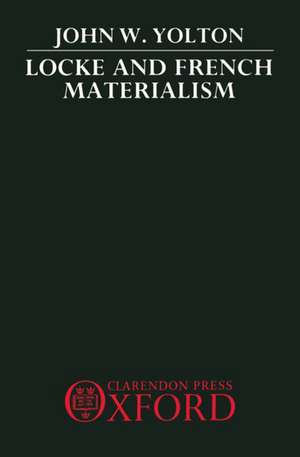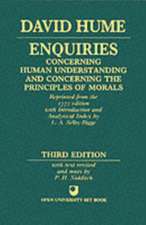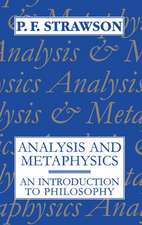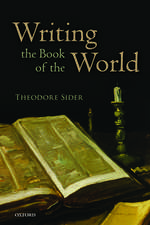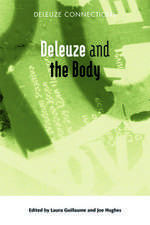Locke and French Materialism
Autor John W. Yoltonen Limba Engleză Hardback – 31 ian 1991
Preț: 874.46 lei
Preț vechi: 1329.87 lei
-34% Nou
Puncte Express: 1312
Preț estimativ în valută:
167.33€ • 178.93$ • 139.51£
167.33€ • 178.93$ • 139.51£
Carte tipărită la comandă
Livrare economică 07-12 aprilie
Preluare comenzi: 021 569.72.76
Specificații
ISBN-13: 9780198242741
ISBN-10: 0198242743
Pagini: 248
Dimensiuni: 144 x 223 x 20 mm
Greutate: 0.43 kg
Ediția:New.
Editura: Clarendon Press
Colecția Clarendon Press
Locul publicării:Oxford, United Kingdom
ISBN-10: 0198242743
Pagini: 248
Dimensiuni: 144 x 223 x 20 mm
Greutate: 0.43 kg
Ediția:New.
Editura: Clarendon Press
Colecția Clarendon Press
Locul publicării:Oxford, United Kingdom
Cuprins
Introduction; The three hypotheses; The French connection; French materialist disciples; Physical influence; David R. Boullier; Systems of philosophy; Journal presentations; Locke among the 'Philosophes'; General conclusion; Bibliography; Index
Recenzii
Yolton accurately and meticulously brings the reader through the texts and authors indicated, and he reports on minor variations in presenting the opposing arguments.
This is an excellent resource for scholars interested in 18th-century philosophy of mind.
Yolton gives us a fascinating account of a question central to eighteenth-century thought in metaphysics, epistemology, and theology.
Professor Yolton is undoubtedly correct that no one has written about the transmission to France, of Locke's suggestion, that there is nothing inconsistent in the notion that God could superadd to matter the power of thought. This book is a worthwhile and scholarly one which traces that transmission as well as French reactions to it ... an important book.
There is a wealth of material here for the historian of ideas.
Locke and French Materialism is an invaluable source of scholarly information, especially about the lesser known writers and the use they made of Locke's suggestion. In this context, the extensive and detailed bibliography compiled by Jean S. Yolton deserves praise as well. The book is an important addition to the literature on Locke and eighteenth-century thought. And it is essential reading for anybody who is interested in the history of `philosophy of mind'.
Yolton's story is highly interesting and it is well told.
Yolton does not confine himself to the household names; he delves deeply in the works of minor writers and in the extensive journal literature of the age ... he contributes a wholly new chapter to the intellectual history of the early modern period. His command of the primary sources is truly impressive. Yolton also has a good eye for some of the ironies of the story he has to tell.
This is an excellent resource for scholars interested in 18th-century philosophy of mind.
Yolton gives us a fascinating account of a question central to eighteenth-century thought in metaphysics, epistemology, and theology.
Professor Yolton is undoubtedly correct that no one has written about the transmission to France, of Locke's suggestion, that there is nothing inconsistent in the notion that God could superadd to matter the power of thought. This book is a worthwhile and scholarly one which traces that transmission as well as French reactions to it ... an important book.
There is a wealth of material here for the historian of ideas.
Locke and French Materialism is an invaluable source of scholarly information, especially about the lesser known writers and the use they made of Locke's suggestion. In this context, the extensive and detailed bibliography compiled by Jean S. Yolton deserves praise as well. The book is an important addition to the literature on Locke and eighteenth-century thought. And it is essential reading for anybody who is interested in the history of `philosophy of mind'.
Yolton's story is highly interesting and it is well told.
Yolton does not confine himself to the household names; he delves deeply in the works of minor writers and in the extensive journal literature of the age ... he contributes a wholly new chapter to the intellectual history of the early modern period. His command of the primary sources is truly impressive. Yolton also has a good eye for some of the ironies of the story he has to tell.
Notă biografică
General Editor of The Clarendon Edition of the Works of John Locke
